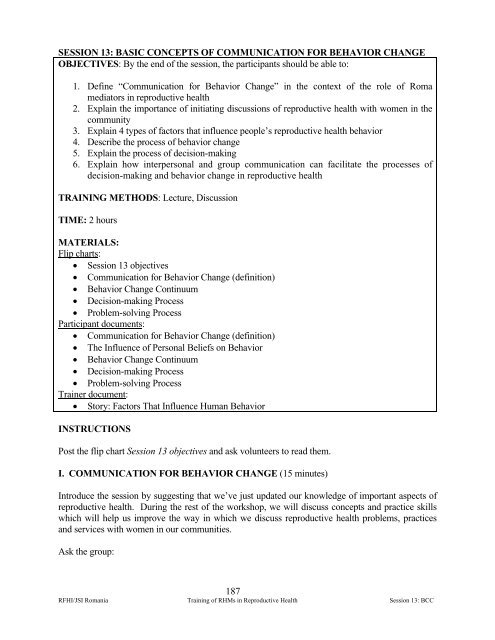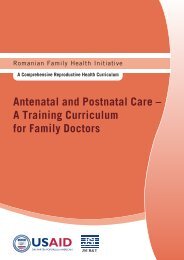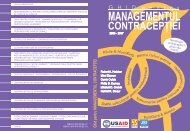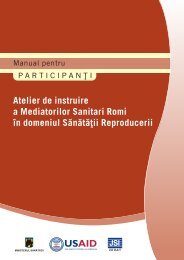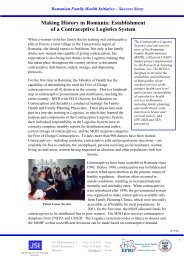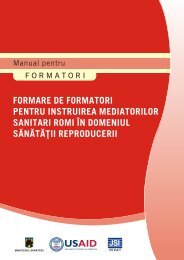Training of Roma Health Mediators in Reproductive Health
Training of Roma Health Mediators in Reproductive Health
Training of Roma Health Mediators in Reproductive Health
You also want an ePaper? Increase the reach of your titles
YUMPU automatically turns print PDFs into web optimized ePapers that Google loves.
SESSION 13: BASIC CONCEPTS OF COMMUNICATION FOR BEHAVIOR CHANGE<br />
OBJECTIVES: By the end <strong>of</strong> the session, the participants should be able to:<br />
1. Def<strong>in</strong>e “Communication for Behavior Change” <strong>in</strong> the context <strong>of</strong> the role <strong>of</strong> <strong>Roma</strong><br />
mediators <strong>in</strong> reproductive health<br />
2. Expla<strong>in</strong> the importance <strong>of</strong> <strong>in</strong>itiat<strong>in</strong>g discussions <strong>of</strong> reproductive health with women <strong>in</strong> the<br />
community<br />
3. Expla<strong>in</strong> 4 types <strong>of</strong> factors that <strong>in</strong>fluence people’s reproductive health behavior<br />
4. Describe the process <strong>of</strong> behavior change<br />
5. Expla<strong>in</strong> the process <strong>of</strong> decision-mak<strong>in</strong>g<br />
6. Expla<strong>in</strong> how <strong>in</strong>terpersonal and group communication can facilitate the processes <strong>of</strong><br />
decision-mak<strong>in</strong>g and behavior change <strong>in</strong> reproductive health<br />
TRAINING METHODS: Lecture, Discussion<br />
TIME: 2 hours<br />
MATERIALS:<br />
Flip charts:<br />
• Session 13 objectives<br />
• Communication for Behavior Change (def<strong>in</strong>ition)<br />
• Behavior Change Cont<strong>in</strong>uum<br />
• Decision-mak<strong>in</strong>g Process<br />
• Problem-solv<strong>in</strong>g Process<br />
Participant documents:<br />
• Communication for Behavior Change (def<strong>in</strong>ition)<br />
• The Influence <strong>of</strong> Personal Beliefs on Behavior<br />
• Behavior Change Cont<strong>in</strong>uum<br />
• Decision-mak<strong>in</strong>g Process<br />
• Problem-solv<strong>in</strong>g Process<br />
Tra<strong>in</strong>er document:<br />
• Story: Factors That Influence Human Behavior<br />
INSTRUCTIONS<br />
Post the flip chart Session 13 objectives and ask volunteers to read them.<br />
I. COMMUNICATION FOR BEHAVIOR CHANGE (15 m<strong>in</strong>utes)<br />
Introduce the session by suggest<strong>in</strong>g that we’ve just updated our knowledge <strong>of</strong> important aspects <strong>of</strong><br />
reproductive health. Dur<strong>in</strong>g the rest <strong>of</strong> the workshop, we will discuss concepts and practice skills<br />
which will help us improve the way <strong>in</strong> which we discuss reproductive health problems, practices<br />
and services with women <strong>in</strong> our communities.<br />
Ask the group:<br />
187<br />
RFHI/JSI <strong>Roma</strong>nia <strong>Tra<strong>in</strong><strong>in</strong>g</strong> <strong>of</strong> RHMs <strong>in</strong> <strong>Reproductive</strong> <strong>Health</strong> Session 13: BCC


